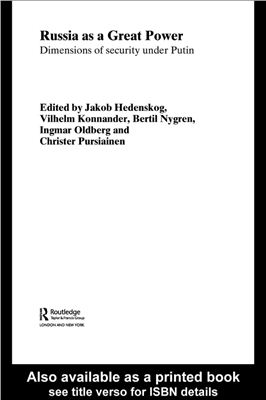Routledge,
2005-06-21
385 pages
After a period of relative weakness and instability during most of the 1990s, Russia is again appearing as a major security player in world politics. This book provides a comprehensive assessment of Russia's current security situation, addressing such questions as:
What kind of player is Russia in the field of security?
What is the essence of its security policy?
What are the sources, capabilities and priorities of its security policy?
One important conclusion to emerge is that, while Russian foreign policy under Putin has become more pragmatic and responsive to both problems and opportunies, the growing lack of checks and balances in domestic politics makes political integration with the West difficult and gives the president great freedom in applying Russia's growing power abroad.
2005-06-21
385 pages
After a period of relative weakness and instability during most of the 1990s, Russia is again appearing as a major security player in world politics. This book provides a comprehensive assessment of Russia's current security situation, addressing such questions as:
What kind of player is Russia in the field of security?
What is the essence of its security policy?
What are the sources, capabilities and priorities of its security policy?
One important conclusion to emerge is that, while Russian foreign policy under Putin has become more pragmatic and responsive to both problems and opportunies, the growing lack of checks and balances in domestic politics makes political integration with the West difficult and gives the president great freedom in applying Russia's growing power abroad.

